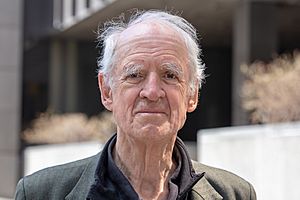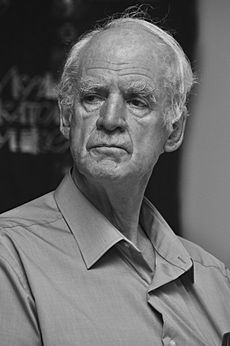Charles Taylor (philosopher) facts for kids
Quick facts for kids
Charles Taylor
|
|
|---|---|

Taylor in 2019
|
|
| Born |
Charles Margrave Taylor
November 5, 1931 |
| Alma mater | |
|
Notable work
|
|
| Spouse(s) |
|
| Awards |
|
| Era | Contemporary philosophy |
| Region | Western philosophy
|
| School |
|
| Institutions | |
| Thesis | Explanation in Social Science (1961) |
| Doctoral advisor | Sir Isaiah Berlin |
| Doctoral students |
|
| Other notable students |
|
|
Main interests
|
|
|
Notable ideas
|
|
Charles Margrave Taylor (born November 5, 1931) is a famous Canadian philosopher from Montreal, Quebec. Philosophers are thinkers who study big questions about life, knowledge, and how people should live. Taylor is known for his ideas on political philosophy and the philosophy of social science. He taught for many years at McGill University.
His important work has won him many major awards. These include the Kyoto Prize, the Templeton Prize, the Berggruen Prize for Philosophy, and the John W. Kluge Prize.
In 2007, Taylor worked with Gérard Bouchard on a special government group. It was called the Bouchard–Taylor Commission. They studied how different cultures could live together respectfully in Quebec.
Contents
Early Life and Education
Charles Margrave Taylor was born in Montreal, Quebec, on November 5, 1931. His mother was a French-speaking Roman Catholic, and his father was an English-speaking Protestant. Because of this, he grew up speaking both French and English.
He went to McGill University and earned a degree in history in 1952. After that, he studied at the University of Oxford in England. He earned another degree in philosophy, politics and economics in 1955. He then earned his Doctor of Philosophy (PhD) degree in 1961.
Career as a Professor
Taylor became a professor at the University of Oxford. He taught social and political theory. He was also a professor of political science and philosophy at McGill University in Montreal for many years. He is now a professor emeritus, which is an honorary title for retired professors.
In 1995, he was made a Companion of the Order of Canada, one of the country's highest honors. In 2000, he was made a Grand Officer of the National Order of Quebec.
Main Philosophical Ideas
Taylor's work covers many topics, but he says he is focused on one main goal. He wants to create a better understanding of what it means to be human. He was influenced by famous thinkers like Georg Wilhelm Friedrich Hegel, Martin Heidegger, and Ludwig Wittgenstein.
Critique of Naturalism
Taylor often wrote about his disagreement with an idea called naturalism. Naturalism is the belief that everything, including human behavior, can be studied just like the natural sciences (like physics or biology).
Taylor argued that this view is too simple. He believed that you cannot understand people just by observing them from the outside. To understand why people do things, you have to understand their thoughts, feelings, and the culture they live in. He wrote that human actions have meaning, and science alone cannot always explain that meaning.
The Importance of Community
Taylor is known as a communitarian. Communitarians believe that our communities are very important for shaping who we are. They argue against some liberal ideas that focus too much on individuals being completely independent.
Taylor said that we are not just isolated individuals who make choices on our own. Instead, our identity and our values come from the society and culture we grow up in. He argued that to understand ourselves, we must understand the social world around us. This social background gives our lives meaning.
Philosophy of Religion
In his later work, Taylor wrote a lot about religion and modern life. His most famous book on this topic is A Secular Age.
In the book, he challenges the idea that as the world becomes more modern and scientific, religion will disappear. This idea is called the secularization thesis. Taylor pointed out that religion has not vanished. Instead, it has changed and become more diverse. He explored what it means to live in a "secular age," where belief in God is one option among many, rather than something everyone shares.
Politics and Public Life
Taylor was also involved in politics. He ran for a seat in Canada's House of Commons four times for the New Democratic Party (NDP). In a famous election in 1965, he ran against Pierre Trudeau, who later became the Prime Minister of Canada. Taylor did not win, but the election received a lot of attention.
He also served as a vice president of the federal NDP. In 2010, he spoke about the importance of fighting against Islamophobia in Canada as part of the country's ongoing work with multiculturalism.
Selected Books
Taylor has written many important books. Here are a few of them:
- Multiculturalism and "The Politics of Recognition" (1992)
- Reconciling the Solitudes: Essays on Canadian Federalism and Nationalism (1993)
- A Catholic Modernity? (1999)
- Secularism and Freedom of Conscience (2011)
- Retrieving Realism (2015)
- Reconstructing Democracy. How Citizens Are Building from the Ground Up (2020)
See also
 In Spanish: Charles Taylor (filósofo) para niños
In Spanish: Charles Taylor (filósofo) para niños
- List of Canadian philosophers
- List of people from Montreal
 | Jewel Prestage |
 | Ella Baker |
 | Fannie Lou Hamer |


